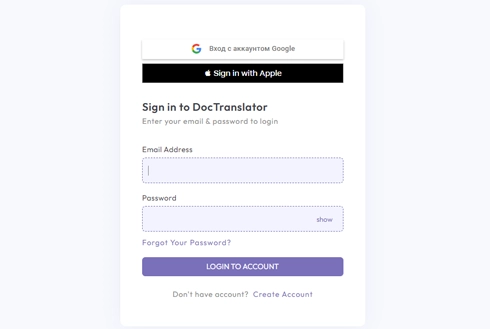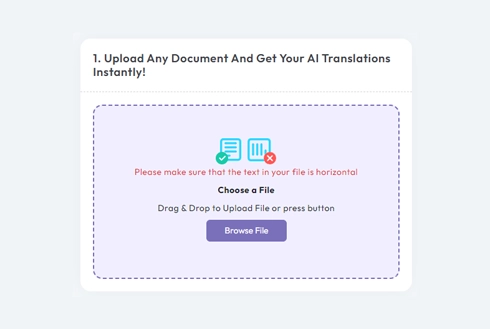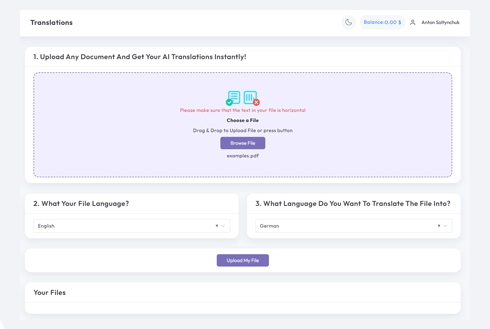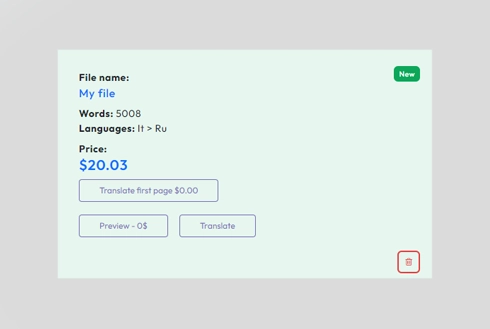
Revolutionizing Communication
Legal Translators

There are many types of documents in the legal industry that may require translation, including contracts, legal agreements, patents, court orders, and documents related to litigation or legal proceedings.
Additionally, documents related to regulatory compliance, such as guidelines and policies, may need to be translated in order to be understood by people who speak different languages.
Other types of legal documents that may require translation include deeds, wills, trusts, and power of attorney documents.
Meet DocTranslator!
DocTranslator is a sophisticated online translation service that allows users to upload various document formats, including Word, PDF, and PowerPoint, and have them translated into different languages. Leveraging the power of the Google Translate engine, DocTranslator is specifically designed for documents and includes extra features that make it more suitable for this purpose compared to standard translation services.
What is legal translation?
Legal translation refers to the translation of documents or materials related to the law, such as contracts, legal agreements, court orders, and other legal documents. Legal translation is an important service that helps to ensure that people who speak different languages are able to understand and access legal information and resources. Legal translators must be highly skilled and knowledgeable in both the source and target languages, as well as the legal systems and terminology of the countries involved. Legal translation can be a complex and nuanced process, as it requires a deep understanding of both language and the law.
Demystifying Legal Titles: Understanding the Difference Between Lawyer and Attorney
In most jurisdictions, the terms “lawyer” and “attorney” can be used interchangeably to refer to a person who is qualified and licensed to practice law. However, there are some subtle differences between the two terms in some places.
In the United States, an attorney is a lawyer who has been admitted to practice law in a particular jurisdiction, usually after passing a bar exam. An attorney is authorized to represent clients in legal matters and can appear in court on their behalf. In contrast, a lawyer is a general term for a person who is qualified and licensed to practice law, but may not necessarily be authorized to appear in court or represent clients.
In some other countries, the term “attorney” refers specifically to a type of lawyer who represents clients in legal proceedings, while the term “lawyer” is used more broadly to refer to any professional who is qualified to practice law.
Overall, the main difference between a lawyer and an attorney is one of title and the specific legal services that they are authorized to provide. Both lawyers and attorneys are qualified to practice law, but an attorney may have additional privileges, such as the right to appear in court and represent clients.
How to convert legal documents into another language?
The translation of legal agreements involves multiple steps:
Select a translator proficient in both the original and target languages with experience in legal translation. It’s crucial to pick someone well-versed in legal terminology to ensure accuracy and fidelity to the original document. Thoroughly examine the original document for completeness and readiness for translation. Make any necessary amendments or revisions before commencing the translation process. Choose an appropriate translation approach based on the document and stakeholders’ requirements. Options may include machine translation, single translator translation, or translation by a team. Initiate the translation process, focusing on meticulous attention to detail and accuracy, particularly regarding legal terms and concepts. Review and proofread the translated document to guarantee error-free content reflecting the original document accurately. Have the translated document assessed and/or approved by a legal expert proficient in both languages. Acquire any mandatory certifications or notarizations for the translated document, as dictated by the jurisdiction’s laws where it will be utilized. In essence, translating legal agreements demands meticulous attention, a thorough grasp of legal terminology, and a commitment to producing precise and faithful translations.
What is the price range for translating legal documents?
The cost varies depending on factors like document length, complexity, language pair, translator expertise, and additional services needed. Legal translation tends to be pricier due to the specialized skills required for accurate translation of legal terms and concepts.
The translation’s purpose and any deadlines can also impact costs. For instance, translations required for legal proceedings may be costlier due to time constraints and the translation’s significance.
Providing an exact cost without specific details is challenging. It’s advisable to obtain quotes from multiple translation providers to compare prices and find the most suitable option for your requirements.
Specific Statistics
User Engagement
DocTranslation boasts impressive user engagement metrics, with over 80% of first-time users returning for future translations. Additionally, our platform maintains a high satisfaction rate, with 95% of customers rating their experience as excellent or good. The average session duration continues to grow, reflecting the ease of use and trust our users place in the platform's quality and reliability.
Daily Conversations
DocTranslation facilitates meaningful cross-cultural communication through thousands of daily conversations. The platform processes more than 20,000 unique translation requests each day, spanning documents in multiple formats. This robust daily activity demonstrates DocTranslation’s capacity to handle high volumes efficiently, helping individuals and businesses bridge language barriers smoothly.
Training Data Size
DocTranslation's cutting-edge AI translation engine is powered by vast training data, with billions of words sourced from diverse, multilingual datasets. This extensive training data enables our system to understand nuanced language structures and idiomatic expressions, resulting in translations that are both contextually accurate and culturally sensitive. Such comprehensive training ensures that users receive consistently high-quality translations across all languages supported.
Steps required
HOW IT’S WORK

Step 1: Create a Free Account
Begin your translation journey by setting up a free account on our platform. It only takes a few moments to provide your basic information and confirm your email address. This account will serve as your personalized hub for uploading, tracking, and managing all your translation projects.

Step 2: Upload a File
After logging in, it's time to upload your document. Our system supports a wide variety of formats, including MS Word, Excel, PowerPoint, TXT, InDesign, and CSV. Simply drag and drop your file or use the “Browse” option to select the file from your device.

Step 3: Select the Original and Target Languages
Specify the language in which your original document is written. Then, choose the target language to which you want the document translated. With our extensive list of supported languages, you'll find the perfect match for your audience, whether it's for a business proposal or a creative campaign.

Step 4: Click the Translate Button and Download
Once you've set your language preferences, click the “Upload” button to begin processing. Sit back and relax while our advanced translation system works on your file, maintaining the original layout and style while delivering an accurate translation.
Get translation for file now!
Sign up today and discover the power of DocTranslator and what it can do for your financial institution.





